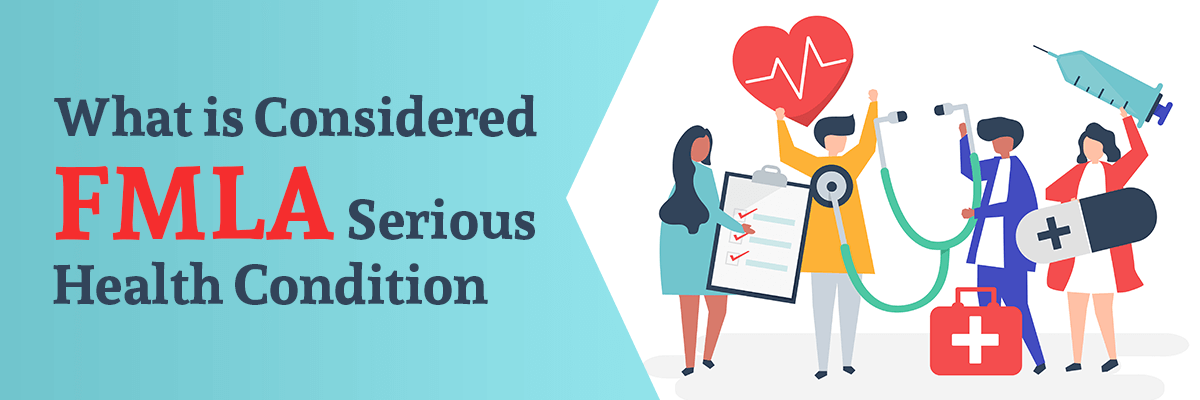The Family and Medical Leave Act (FMLA) provides eligible employees with up to 12 weeks of unpaid, job-protected leave per year for specific family and medical reasons.
One of the most commonly misunderstood aspects of FMLA is what actually qualifies as a “serious health condition.” This blog breaks down the definition, the types of conditions that qualify, what doesn’t meet the criteria, and what employers can request regarding medical certification.



Definition of a “Serious Health Condition” Under FMLA
Under FMLA, a serious health condition is defined as an illness, injury, impairment, or physical or mental condition that involves either:
- Inpatient care (i.e., an overnight stay in a hospital, hospice, or residential medical care facility), or
- Continuing treatment by a healthcare provider.
This definition may seem broad, but it ensures coverage for a wide range of conditions—both chronic and temporary—that require time off for treatment or recovery. It’s important for employers and employees to fully understand this definition to avoid confusion or mismanagement of leave.
For more clarity on FMLA eligibility rules and requirements, this detailed guide covers who qualifies and under what circumstances.
Types of Serious Health Conditions Under FMLA
Some examples of serious health conditions that typically qualify for FMLA leave include:
- Chronic conditions such as asthma, diabetes, or epilepsy, which require periodic visits to a healthcare provider and may cause episodic incapacity.
- Pregnancy and prenatal care, including severe morning sickness, doctor’s appointments, or incapacity due to pregnancy.
- Long-term or permanent conditions, such as Alzheimer’s disease or cancer, even if the employee is not receiving active treatment.
- Conditions requiring multiple treatments, such as chemotherapy, dialysis, or physical therapy.
- Surgical procedures that involve a period of incapacity or inpatient care.
To explore this topic in more depth, check out our blog on types of serious health conditions under FMLA and how they intersect with ADA protections.
What Does Not Qualify as a Serious Health Condition?
Not every medical issue meets the FMLA threshold. Examples of conditions that generally do not qualify include:
- Minor illnesses such as the common cold, flu (unless complications arise), or earaches
- Routine dental or orthodontia problems
- Cosmetic treatments (unless complications develop)
- Upset stomachs or headaches that do not require continuing treatment
However, even conditions that seem minor at first can escalate into something more serious. For instance, a viral infection that leads to hospitalization would then likely qualify under FMLA.
Medical Certification Requirements
Employers are allowed to request medical certification to support the need for FMLA leave. Here’s what employers and employees need to know:
What Employers Can Request
Employers may ask for certification that includes:
- Contact information of the healthcare provider
- Date the condition began and its expected duration
- A statement that the employee is unable to perform the functions of their job
- Information on the need for intermittent or continuous leave
Deadlines for Submitting Certification
Employees must typically provide the requested certification within 15 calendar days of the employer’s request. If the documentation is incomplete or insufficient, the employer must give the employee a chance to correct the issue.
Recertification Rules
Employers may request recertification:
- Every six months in connection with an absence
- When the circumstances of the leave change significantly
- When the employer receives information casting doubt on the leave’s validity
Employers must remain cautious and consistent with how they request and handle certification to avoid legal pitfalls. If you suspect misuse of leave, our blog on uncovering FMLA abuse can offer insights and strategies.
To deepen your understanding, don’t forget to check out our expert-led FMLA webinars covering real-life scenarios, legal updates, and best practices for managing leave effectively.
Conclusion
Understanding what is considered a serious health condition under FMLA is critical for both employers and employees.
The definition extends beyond hospital stays and includes ongoing treatment, chronic conditions, and any health issue requiring serious and structured care.
However, not all illnesses or treatments qualify, and employers must manage leave requests with proper documentation and procedural accuracy.


